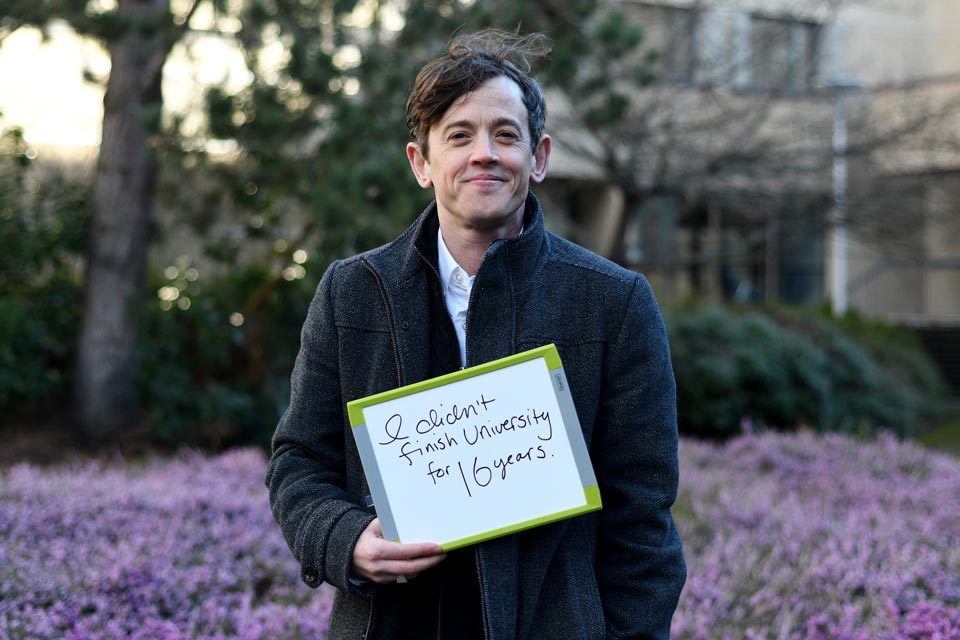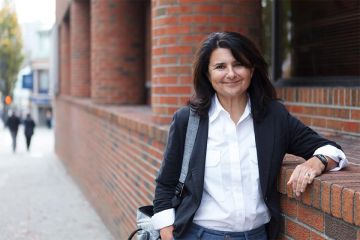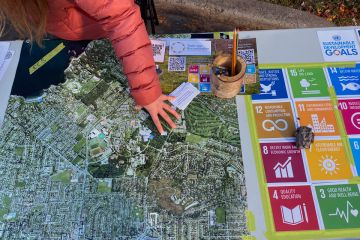Mental health initiative shares stories of loss—and survival
- Stephanie Harrington

Ali Blythe was 17 years old and straight out of high school when he enrolled in university. His grades were low and one day he received a letter from the university asking him to leave.
More struggles, including a cancer diagnosis, ensued. But eventually Blythe found his way back to the classroom. In 2009, he graduated from the University of Victoria with a Bachelor of Fine Arts in writing. Blythe figured he had had stories to tell—so he kept writing.
“The poems I started writing after university would became my first book called Twoism. I was also in the process of transitioning gender so as I wrote this book I was becoming myself,” Blythe says.
It took him 16 years to finish university, but in the past four years, Blythe has published two lauded books of poetry, including his recent collection Hymnswitch.
UVic Bounce video series launched
Students had the chance to listen to Blythe’s story on Oct. 15 at the launch of UVic Bounce, a new mental health initiative based in the Faculty of Humanities. Inspired by the Stanford Resilience Project, UVic Bounce seeks to normalize and de-stigmatize the challenges that students experience at university.
Founder and director Rebecca Gagan says part of the initiative is a video series in which UVic professors, alumni and students share their stories of success and failure. Gagan, an assistant teaching professor in the Department of English who teaches primarily first-year students, says she has noticed in the past five years an increase in the levels of distress and struggle in her classes.
“Students often feel ashamed to disclose their struggles and also feel very much alone,” she says. “By sharing these stories, we hope it might become easier for students to acknowledge and share their own struggles, and to seek the support that they need.”
Talk to your profs—they have faced challenges too
UVic Bounce stories include Adrienne Williams Boyarin’s account of being diagnosed with cancer while completing a PhD. Boyarin, an associate professor in the Department of English, returned to her studies after treatment, but regrets not taking more time to heal.
“It’s important to know that a lot of professors have been through serious challenges, around health, around mental health, around work, schedule and family,” Boyarin says. “If you communicate about what’s going on, there’s a lot that can be done, a lot that can be understood, a lot of compassion.”
The UVic Bounce launch event will include a discussion with Blythe, Associate Professor Audrey Yap, from the Department of Philosophy, and UVic student Chad Dickie, who didn't start university until age 50, after he suffered a stroke.
"I never felt smart enough, I never felt higher education was something I could actually pursue," he said.
Now Dickie's studying for a BA in Health and Community at UVic. A member of the Fort Nelson First Nation, Dickie is the first Indigenous chair of AVI Health & Community Services (formerly AIDS Vancouver Island).
Bounce builds on existing UVic mental health resources
Gagan says she hopes UVic Bounce will expand to include a peer support program and classroom resources for instructors to help develop an even more compassionate and supportive community where students can find the help they need.
“UVic Bounce is one more contribution to the already very comprehensive program of mental health resources for students here at UVic,” Gagan says.
Blythe, meanwhile, says it takes time to “become yourself, to be who you want to be.”
“Look for the things that make you feel like yourself,” he says.Photos
In this story
Keywords: mental health, student life
People: Rebecca Gagan, Adrienne Williams Boyarin, Ali Blythe, Audrey Yap, Chad Dickie
Publication: The Ring






